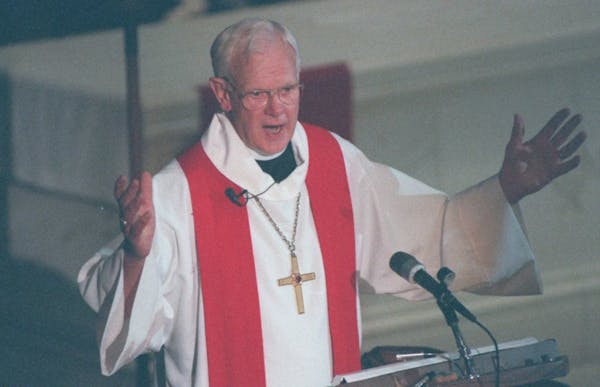Thanks, Archbishop!
John Nienstedt, who leads the Archdiocese of St. Paul and Minneapolis, has been subjected to much disrespectful criticism -- from members of his flock, and even from a Lutheran bishop -- regarding his lead role supporting the marriage amendment. He stands accused of forcing his religion on everyone, and of forcing the consciences of his fellow Catholics. Though not unexpected, the charges are unfair.
What is the dispute about? One side holds that marriage is a vow of a man and a woman before the community to engage in a project that is greater than the couple, and that the community should hold them to it. This has been the universal view of marriage since time immemorial. The other side thinks that marriage (or civil union) is an expression of the desires of two people (their gender doesn't matter), and that the community must support them whatever they choose -- to have sex (and perhaps children) within marriage or not. To accept one definition, one must reject the other.
Due to the encroachments of the revisionist view of marriage into law, typically by judicial fiat, the institution is in some danger. Thus, those who wish to protect that time-honored institution seek to define it in the state Constitution.
This essentially is their argument. There is only one reason the community is interested in the friendships and sexual arrangements of human beings: When a man and a woman are united sexually, the natural (and frequent) result is children. Children on the whole do best, by any measure, when they are united with their biological parents, who are themselves united before the community to each other. If sex did not lead to children, no one would ever have thought up the institution of marriage. It would be a strange, intrusive insinuation of the community into the lives of its citizens. On the other hand, this union of man and woman, and the resulting children, are the cornerstone of every society that has ever existed.
Because of its importance to the beginning of human life and community, marriage has great religious significance. Catholicism even holds that, between two baptized Christians, it is sacramental, and reflects the life of the Trinity as a community of self-giving love. But marriage was not invented by religion. It is part of the nature of reality which, for the good of human flourishing, must be protected in law. To be "forced" to live with this definition is like being "forced" to live with the laws of physics.
What this alternative view expects, however, is for government to adopt a definition of marriage that contradicts the nature of human beings and our long experience, a new definition that says marriage is whatever the people involved say it is. In other words, the revisionists wish to impose their view on the rest of us. To this we say: Leave it alone.
By refusing to adopt this revised definition, the community is not failing to respect the rights and dignity of those who believe it, any more than it is required to adopt an alternative, flat-earth model for global air and shipping control, in order to respect the opinions of flat-earthers. Indeed, if it did so, the results would be disastrous.
A Catholic bishop is sworn to proclaim and defend the deposit of faith and morals passed on to him. He receives his authority from the laying on of hands in unbroken succession from the apostles to this very day. The priest is sworn to help the bishop, from whom he receives his authority. Together, their task is to urge the rest of us to accept the deposit of faith and morals as our own, and to act rightly in accordance with the truth. Failure to so act in general will not lead to human flourishing. In this situation, to accept the revisionist notion of marriage logically necessitates a rejection not only of reality, but of both Catholic teaching and the authority given to bishops by Christ.
This is serious. For Archbishop Nienstedt to point this out is hardly a violation of anyone's conscience, but is an urgent plea to live in the truth.
I, for one, am thankful for the reminder.
----------------------
Stephen J. Heaney is an associate professor of philosophy at the University of St. Thomas. The university wishes you to know that he does not speak for it. Heaney also serves on the Archdiocesan Bioethics Commission, the marriage preparation program, and the Faith in Action board. To read more marriage amendment commentaries, go here.
Readers Write: Caucus system, state Sen. Nicole Mitchell, voting for RFK Jr.
Turn off cellphones in state's classrooms
How many hostages are still alive? Hamas doesn't seem to know


